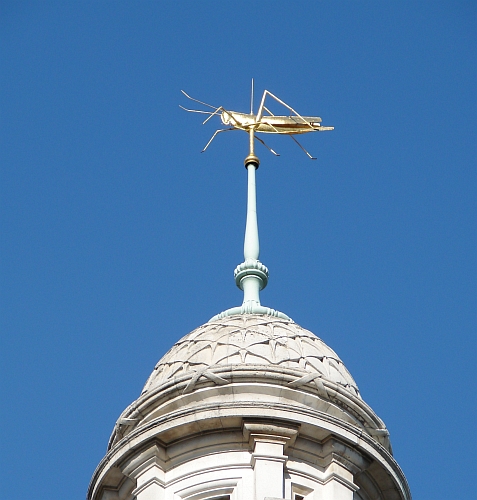
THE GRASSHOPPER
ON THE ROYAL EXCHANGE.
WHENEVER I go to London, I always stand at the corner of the Bank of England for a minute or two, watching the crowd of busy men hurrying everywhere. What thousands of cares they carry!
How many anxieties! Then I look at the Royal Exchange. It is pleasant to see the London sparrows, though they are a little black and gamy, chirping on the massive cornices, as free and happy as possible, above the din and awful hurry of the great city.
They have no cares, no anxieties.
They seem to know what the great letters mean which are cut in the stones on which they hop,
"The earth is the Lord's and the fullness thereof."
God keeps the sparrows, and they are happy. I wish the busy city men would watch the sparrows,
and read the great city text.
But the sparrows and the text are not the most attractive things about the Exchange, and I am sure, if you look at it, you would think as I do—that the weathercock is the most singular and curious thing about the building. It is not like any other weathercock in England, or, I should think, in the world; for there, twisting on the pinnacle of the spire, is a monstrous grasshopper; and I'll tell you how it came to be there.
About three hundred and fifty years ago a woman with a little baby in her arms was trudging along a country lane. Presently, after looking to see that no one was watching her, she climbed over a gate into the field, and wrapping the baby in its little shawl, laid it down in the grass so gently as not to awaken it, and then, never even looking behind her, she climbed over the gate again into the lane, and went on her journey.
The baby soon awoke, and began to cry, and it cried for a long, long time. And at last, tired and hungry, and hot with the sun, for it was a fine summer's day, it was wearied out and dropped off to sleep again. But God had heard the voice of the lad, and we shall see how simply he brought help for the little one.
By-and-by down the lane came a schoolboy; he was whistling away as happy as ever he could be;
he had just come out of school and was going home. He lived at the farmhouse a little way further up the lane. Now he gathered a few primroses, now he scampered after a butterfly, now he had a shy at a bird; but just as he came at the gate over which the woman had climbed, he heard a grasshopper chirping away so loudly that he sprang over the gate to catch him, and there was the baby, fast asleep! Far more pleased than if he had caught a hundred grasshoppers, the boy took up the little fellow, and ran home with his prize. The kind father's wife, although she had many children of her own, at once determined to keep the little orphan who had been saved from death by a grasshopper.
Years passed away, and the baby became a strong boy; the boy grew to be a man; he went to London and became a merchant. God blessed all he did, and he rose to be the most noted man in the city. Queen Elizabeth was then on the throne, and often did she send for Sir Thomas Gresham—for the little deserted boy had become a knight—to consult him on the great affairs of state.
Just three hundred years ago Sir Thomas Gresham founded the Exchange. The queen came to dine with him, and to lay the first stone; and there upon the topmost pinnacle Sir Thomas placed a grasshopper; and there it is today to tell the busy, toiling city, and to tell you and me when we go to see the city, that Almighty God will hear the infant's cry, and can save a valuable life by even such a little thing as a grasshopper. So it was that God heard the voice of the lad.
London Christian Advocate.